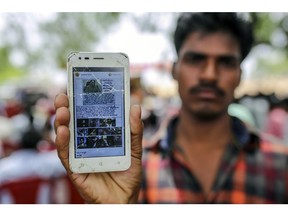His brother heads a company ‘involved in the sale and production of surveillance and hacking tools for information warfare and signal intelligence’

An Indian national refused permanent residency in Canada by a visa officer who believed he had links to an outfit behind Indian “disinformation campaigns,” and fake news reports will get another shot at obtaining the status.
Recommended Videos
The man, identified only as A.S in a recent Federal Court decision, is brothers with the CEO of a company known as Aglaya.
“Aglaya is involved in the sale and production of surveillance and hacking tools for information warfare and signal intelligence,” Justice Paul Favel wrote in a Jan. 31 decision out of Ottawa.
“The (visa) officer noted Aglaya appears to be a subsidiary or affiliate of the Srivastava Group, sharing the same physical (New Delhi) address.”
On March 4, 2022, the visa officer sent A.S. a letter saying “there are reasonable grounds to believe” he’s a member of the Srivastava Group, “playing a major supervisory and decision-making role across its various businesses.”
Since A.S. was initially refused his permanent residency, which he applied for in 2018, “there have been several open-source articles and investigations regarding the activities of the Srivastava Group and its subsidiary companies,” said the decision.
Believing A.S. “is a member of the Srivastava Group, and an immediate family member of Aglaya’s CEO, the (visa officer said they) had reasonable grounds to believe the applicant posed a serious and credible threat to Canada’s infrastructure and national security.”
The visa officer saw “significant linkages between the applicant and disinformation campaigns,” said the decision.
“The officer identified a December 2020 report by a non-governmental organization named EU DisinfoLab, linking the Srivastava Group to disinformation campaigns aiming to: discredit nations in conflict with India; misuse NGOs and think tanks accredited by the United Nations; misappropriate the names of European Union politicians; and to create fake media outlets that publish and amplify content used to attack those deemed contrary to India’s interests,” said the decision.
“The officer also noted the Canadian Broadcasting Corporation identified the Srivastava Group as connected to fake news operations targeting South Asian populations in Canada, including 16 websites designed to look like local Canadian news websites.”
A.S. responded in a 57-page letter, denying any connection to Aglaya, said the decision.
“The applicant denied any connection between his brother and the Srivastava Group, denied that Aglaya is a subsidiary or affiliate, and denied the Srivastava Group had engaged in any disinformation campaigns.”
According to the judge, the visa officer “erred in finding limited evidence to show a lack of connection between the two companies, leading to an adverse credibility finding against the applicant.”
First, Favel said, “the evidence is insufficient to establish an ‘institutional link’ with or ‘knowing participation’ in the group’s activities based on executive members’ family ties and a shared office address. The legal test requires reasonable grounds to believe rather than reasonable suspicions.”
Second, the visa officer “erred by discounting the applicant’s sworn statement, focusing exclusively on evidence that was not submitted. The applicant is in the difficult position of having to prove a negative, that he is not a member of Aglaya. It is difficult to contemplate what evidence would have satisfied the officer that no connection exists between the applicant and the Srivastava Group. The officer also had no concrete evidence, such as business records, to establish the link between the applicant and Aglaya. Therefore, the officer’s finding is based on speculation and an absence of credible evidence.”
The visa officer would need credible evidence, said the judge, “that the applicant had done, or would do, something to support a ‘danger to the security of Canada’ conclusion. The officer’s reasoning is flawed. There is no reasonable basis to conclude that Aglaya is a subsidiary or affiliate of Srivastava Group, nor that the applicant’s presence in Canada presents a threat to Canadian infrastructure.”
The finding would still be unreasonable if the visa officer was able to determine “Aglaya is a subsidiary or affiliate of Srivastava Group,” Favel said.
“There is no evidence to suggest that the applicant had done anything posing a threat to the security of Canada. Mere guilt by association is insufficient.”
The judge allowed A.S.’s application for judicial review. “The matter is remitted for redetermination by a different officer.”
Our website is the place for the latest breaking news, exclusive scoops, longreads and provocative commentary. Please bookmark nationalpost.com and sign up for our daily newsletter, Posted, here.